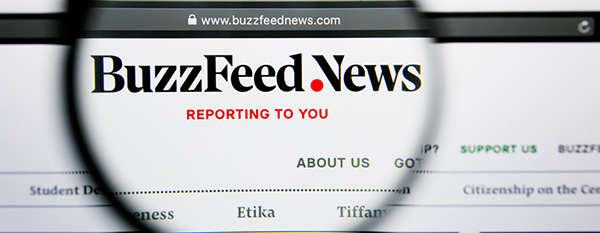 |
||||||||||||
|
||||||||||||
| BuzzFeed News Joins Digital Graveyard |
 |
| Last week, former employees of BuzzFeed News took to social media to eulogize the once-renowned media platform, which shut down after years of popularity in the pop culture space. Management assured employees that the site would be archived, forever displayed in the digital museum as a millennial bygone left behind with the times. BuzzFeed News is one of many millennial-era news sites to meet its digital maker. The Gawker 2.0, Input, and Outline had to face the music after Bustle Digital Group attempted to revitalize the brands. It's hard for new sites to stand out in this oversaturated digital era, but what happened to BuzzFeed News, which was once a staple of millions of millennial households? According to BuzzFeed Inc's CEO and Founder, Jonah Peretti, the site shut down last Thursday due to an over-investment in the website. He realized that while BuzzFeed targeted the site toward a social media-based audience, "those platforms did not provide distribution or financial support required to operate a free news site." Publishers also noted a significant decrease in site referrals from social media for publishers, resulting in reduced site traffic. Buzzfeed News called out Facebook's referral rates in their last few earnings calls. While Facebook's botched referral rates stem from the effects of Apple ATT, news publishers are also facing the consequences. In addition, Twitter's instability and the potential Tik Tok ban have made some of the most popular social media brands unreliable as a referral source for publishers. "BuzzFeed News was a social media ecosystem company, and the ecosystem went away," said a former BuzzFeed exec. "HuffPost was a pre-social media company that BuzzFeed eclipsed in the social media age. And then as social media goes away, the tide comes out, but HuffPost is still kind of there among the rocks." |
| News publishers have struggled to maintain consistent revenue since major social media platforms emerged. For one, many of the younger generations get their news straight from social media, and as mentioned above, site referral rates are decreasing. Many news sites could not recover from the brand safety beating they took during the height of the Covid pandemic and the social unrest caused by the death of George Floyd. It's unfortunate to say, but traditional digital news sites are becoming a fixture of the past. A medium that we will rely solely on the nostalgia factor, like cassette tapes or typewriters. Although, there are moves in play to keep these news sites afloat. In March, California Assemblymember, Buffy Hicks, proposed a state-level journalism usage fee bill inspired by the JCPA. The JCPA was introduced to Congress and passed out of the Senate Judiciary Committee in September 2022. The bill nearly passed into law in December, but threats from Meta to pull news from Facebook halted the bill from passing. The Journalism usage fee bills would have allowed local news outlets to work together to bargain with tech giants, such as Facebook and Google, to collect a fee for using their content and selling advertising alongside it. Hicks' bill, the CJPA, is specific to California. "The CJPA provides a lifeline for news outlets – large, small, and ethnic – by directing a portion of the ad dollars back to the print, digital, and broadcast media that bear the entire cost of gathering and reporting local news while Big Tech bears none," Wicks said. On the other hand, the bill has very loud detractors. For instance, Free Press Action released a petition to stop the CJPA from passing into law. They claim the bill is "the wrong solution to the state's local-news crisis. This bill is a huge handout to the same companies — including conglomerates like Gannett and hedge funds like Alden Global Capital — that have systematically destroyed local news." Whether you agree on the solution, the data shows journalism and news publishers are struggling. The shutdown of Buzzfeed and the recent firing of Paper Magazine's editorial staff hint that this will be a long uphill battle. |
|
| Meta: A Mixed Bag of News, but Revenue Remains Strong |
 |
| After news of a second round of mass layoffs, Meta's Q1 revenue earnings are rising. The walled garden previously projected that their Q1 earnings would decline, but fate had a different destiny for them. "We had a good quarter, and our community continues to grow," said Meta CEO and founder Mark Zuckerberg. "Our AI work is driving good results across our apps and business. We're also becoming more efficient to build better products faster and put ourselves in a stronger position to deliver our long-term vision." It marks the first quarter that Meta's YoY revenue grew after three consecutive quarters of revenue decline. Some surmise that this stems from the layoffs and the restructuring of their business. In addition, others suggest that Meta's revenue growth is a sign that the ad market is recovering from the ad recession. Google's parent company, Alphabet, also saw revenue growth in the first quarter. Meta had a tough year last year — a string of lawsuits, massive revenue losses due to Apple's ATT, and shots fired at their ad business — but their Q1 earnings look like they're moving back up in the world. Meta's projected Q2 earnings are supposed to continue this string of luck, but we'll have to wait and see. |
| Meta's Q1 earnings call was a sign of celebration for the tech company, but there was also cause for concern. A looming regulatory decision in Europe could halt Meta's data practices. On May 12, the EU will decide if it will stop the tech giant's European data flow. "We expect the Irish Data Protection Commission (IDPC) to issue a decision in May in its previously disclosed inquiry relating to transatlantic data transfers of Facebook EU/EEA user data, including a suspension order for such transfers and a fine," Meta's CFO wrote in its Q1 2023 report. Analysts project Meta will lose 10% of their revenue if the regulation goes into effect. Although, there is still hope for Zuckerburg and his global empire. The tech company hopes that a new high-level data transfer pact will pass in Europe to remedy the legal confusion around EU data exports. There is still no guarantee that the regulation will pass. The commission in charge of the pact has dragged its feet longer than expected, and the new EU institutions are still reviewing the draft released in December. It may be their saving grace, but maybe their optimistic projections are enough to keep them out of the black. |
| Google's Privacy Sandbox Shows Promise, With Caveats |
 |
| So far, the road to replacing third-party tracking cookies in Chrome has been paved with gravel. From browsers not opting in to FLoC, to FLoC actually flopping, the CMA stepping in to oversee Privacy Sandbox developments, to Topics API and FLEDGE taking center stage, to the timeline for the cookie cutoff getting pushed back again — it’s been a whirlwind, making it harder for pubs to keep up with developments from one week to the next. Lately, though, we’ve been hearing from publishers like CafeMedia, who has been testing various cookie alternatives, that FLEDGE, most recently renamed Protected Audience API, will surely serve as the post-cookie path forward for Chrome. So for the pubs still sitting idly by on the sidelines waiting for the ax to drop, now is the time to start digging into the Sandbox and getting messy instead of just kicking the tires around. The results of Google’s interest-based advertising test are in and it’s looking like Chrome’s cookieless targeting solutions are performing fairly well, with about a 1-10% decrease in spending, conversions, and CTR. We provided a glimpse into those results in last week’s Wrapper, noting that IBA spending decreased minimally relative to cookies, as did performance metrics. But ROI (conversions) decreased less than ad spend. The experiment also highlighted that AI-powered optimization could positively impact campaign effectiveness. It all sounds promising until you look a little deeper under the hood. For instance, the tests highlight the results of three signals grouped together — Contextual Signals, Topics API, and PPIDs — making it difficult to ascertain just how effective any of these signals are on their own. As well, the trial only ran for just five weeks, and third-party cookies were incorporated for attribution, retargeting, and frequency capping. In general, publishers, SSPs, and marketers are wary that life after cookies will all be solved by these solutions and they aren’t testing them at the levels necessary for the industry to put all of their faith into Google. Like any new ad tech solution, cookieless ones won’t come without challenges. Graham Media, which runs local TV news stations and websites in Detroit, Houston, and Orlando, FL, has restored 60-70% of demand, lost to Safari and Firefox, using Google’s PPID and Local Media Consortium’s NewsPassID. But making the transition has not been easy for the publisher. PPID works inside cookie-based environments, so Graham Media has been slow to turn cookies off completely. It sounds like we won't know what a true cookieless advertising ecosystem looks like, or how well any cookieless solution works until everyone is ready to embrace change. Or maybe everyone will just wait until the cookie has breathed its last breath and there is no other choice. |
| Around the Water Cooler |
 |
| The Guardian Earns Revenue From Contextual Targeting News Publishers have expressed frustration over losing ad dollars to ad tech vendors for quite some time, but The Guardian just found its happy ending. The publisher announced on April 20 that they are working with contextual ad tech company, Illuma, to claim their ad revenue. (Digiday) Agency Projections are Solid, Especially Those Focused On Data U.S. agencies’ revenue across all industries grew 9.9% in 2022, according to Ad Age’s Annual Agency Report. Projections for 2023 are lukewarm, but industry innovation will help agencies continue to stay afloat. (Ad Age) Facebook Ad Glitch Leaves Advertisers Fuming Over the weekend, Facebook reportedly had one of the worst ads glitches that ad professionals have seen in over a decade. The glitch forced a widespread set of advertisers to lose most of their spending that day in a span of a few hours, and they are demanding a refund. (CNBC) The Power of Closed-loop Attribution Q1 '23 Edition of walled garden advertising growth; again highlighting the power of closed-loop attribution, as $AMZN continues to be the only platform with double-digit advertising growth. (@conorjmckenna) For Now, Google Can't Escape DOJ's Antitrust Suit U.S. District Judge Leonie Brinkema denied Google’s request to dismiss the case, finding that the Justice Department’s complaint filed in January was sufficiently detailed to proceed. This is not a final ruling, and Google is expected to make additional attempts to halt the case before trial. (The Wall Street Journal) |
 |
|||||||
|
|||||||
 |
|||||||
|
|||||||
 |
|||||||
|









